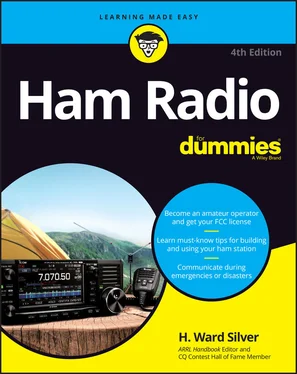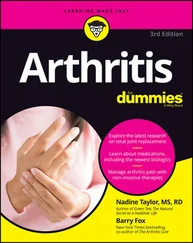Finding and choosing a club
Here’s one way to find ham radio clubs in your area:
1 Go to www.qrz.com/clubs then use the “List clubs in” menu to select your area, or enter a club name.
2 From the list of clubs in the database, click on the club name to go to their website.For an example club listing, see the nearby sidebar “Checking out a club.”
 The ARRL, covered later in this chapter, also has a directory of affiliated clubs at
The ARRL, covered later in this chapter, also has a directory of affiliated clubs at www.arrl.org/find-a-club . You can look up clubs by name or a keyword, by city/state/province/Zip Code, or by ARRL Section or Division.
If more than one club is available in your area, how do you make a choice? Consider these points when making a decision:
Which club has meetings that are most convenient for you? Check out the meeting times and places for each club.
Which club includes programs that include your interests? On the club’s website or newsletter, review recent programs and activities to see if they sound interesting. Are there any activities coming up you could take part in?
Which club has activities for new hams? General-interest and service clubs often have activities designed specifically to educate, train, and welcome new hams. These are good starter clubs for you.
Which club has informal “meet and greet” activities? Many clubs have an informal breakfast or after-work every so often. It’s a great way to introduce yourself to some of the members and ask questions without going to a full-blown meeting.
Which club feels most comfortable to you? Don’t be afraid to attend a meeting or two to find out what different clubs are like.
You’ll quickly find out that the problem isn’t finding clubs, but choosing among them. Unless a club has a strong personal-participation aspect, such as a public-service club, you can join as many as you want just to find out about that part of ham radio.
I found this listing for one of the largest clubs in western Washington state through the ARRL website:
Mike & Key Amateur Radio Club
City:Renton, WA
Call Sign:K7LED
Specialties:Contest, Digital Modes, DX, General Interest, Public Service/Emergency, Repeaters, VHF/UHF
Services Offered:Club Newsletter, Entry-Level License Classes, General or Higher License Classes, Hamfest, License Test Sessions, Mentor, Repeater
Section:WWA
Links: www.mikeandkey.org
This club is well suited to a new ham. You’ll find yourself in the company of other new license holders, so you won’t feel self-conscious about asking questions. The club offers educational programs, activities, and opportunities for you to contribute.
 Are you a college student or looking for a college radio club? Check out the ARRL Collegiate Amateur Radio Initiative on Facebook (
Are you a college student or looking for a college radio club? Check out the ARRL Collegiate Amateur Radio Initiative on Facebook ( www.facebook.com/groups/ARRLCARI ) to find college clubs and see what they are up to.
Participating in meetings
After you pick a general-interest club, show up for meetings, and make a few friends right away, your next step is to start participating. But how?
 Obviously, you won’t start your ham club career by running for president at your second meeting, but ham clubs are pretty much like all other hobby groups, so you can become an insider by following a few easy first steps. You’re the new guy or gal, which means you have to show that you want to belong. Here are some ways to get acquainted and fit in:
Obviously, you won’t start your ham club career by running for president at your second meeting, but ham clubs are pretty much like all other hobby groups, so you can become an insider by following a few easy first steps. You’re the new guy or gal, which means you have to show that you want to belong. Here are some ways to get acquainted and fit in:
Right at the start, introduce yourself to a club officer as a visitor or new member as soon as you get to the meeting. If a “stand up and identify yourself” routine occurs at the beginning of the meeting, be sure to identify yourself as a new member or visitor. If other people also identify themselves as new, introduce yourself to them later.
Show up early to help set up, make coffee, hang the club banner, help figure out the projector, and so on. Stay late and help clean up, too.
Be sure to sign in, sign on, or sign up if you have an opportunity to do so, especially at your first meeting.
Wear a name tag or other identification that announces your name and call sign in easy-to-read letters.
Introduce yourself to whomever you sit next to.
After you’ve been to two or three meetings, you’ll probably know a little about some of the club’s committees and activities. If one of them sounds interesting, introduce yourself to whoever spoke about it and offer to help.
Show up at as many club activities and work parties as possible.
Comb your hair. Brush your teeth. Sit up straight. (Yes, Mom!)
These magic tips aren’t just for ham radio clubs; they’re for just about any club. Like all clubs, ham clubs have their own personalities, varying from wildly welcoming to tightly knit, seemingly impenetrable groups. After you break the ice with them, though, hams seem to bond for life.
 When you’re a club elder yourself, be sure to extend a hand to new members. They’ll appreciate it just as much as you did when you were in their shoes.
When you’re a club elder yourself, be sure to extend a hand to new members. They’ll appreciate it just as much as you did when you were in their shoes.
Now that you’re a regular, how can you get more involved? This section gives you some pointers.
Volunteering your services
In just about every ham club, someone always needs help with the following events and activities:
Field Day: Planners and organizers can always use a hand with getting ready for this June operating event (see Chapter 1). Offer to help with generators, tents, and food, and find out about everything else as you go. Helping out with Field Day — the annual continent-wide combination of club picnic and operating exercise — is a great way to meet the most active members of the club. Field Day offers a little bit of everything ham radio has to offer.
Conventions or hamfests: If the club hosts a regular event, its organizers probably need almost every kind of help. If you have any organizational or management expertise, so much the better. (I discuss hamfests and conventions in detail later in this chapter.)
Club “stuff”: Managing sales of club logo items is a great job for a new member. You can keep records, take orders, and make sales at club meetings.
 If you have a flair for graphic art, don’t be afraid to make suggestions about designing these items or new ones the club might enjoy.
If you have a flair for graphic art, don’t be afraid to make suggestions about designing these items or new ones the club might enjoy.
Shared equipment: Many clubs maintain a supply loaner equipment. All you have to do is keep track of everything and make it available to other members.
Club station: If your club is fortunate enough to have its own radio station or repeater, somebody always needs to do maintenance work, such as working on antennas, changing batteries, tuning and testing radios, or just cleaning. Buddy up with the station manager, and you can become familiar with the equipment very quickly. You don’t have to be technical — just willing.
Читать дальше

 The ARRL, covered later in this chapter, also has a directory of affiliated clubs at
The ARRL, covered later in this chapter, also has a directory of affiliated clubs at  When you’re a club elder yourself, be sure to extend a hand to new members. They’ll appreciate it just as much as you did when you were in their shoes.
When you’re a club elder yourself, be sure to extend a hand to new members. They’ll appreciate it just as much as you did when you were in their shoes.










